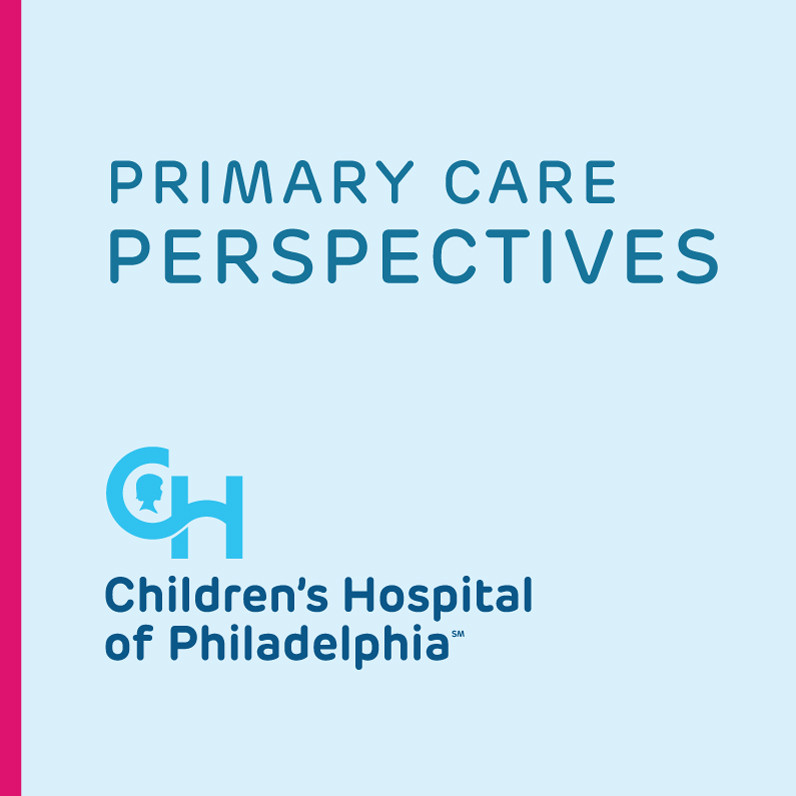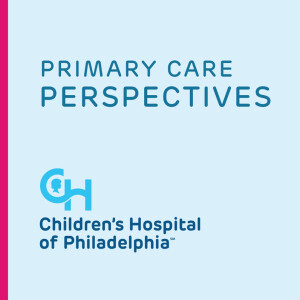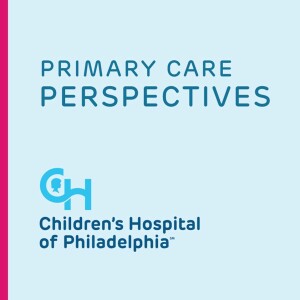
160.9K
Downloads
208
Episodes
Listen in as Katie Lockwood, MD, a primary care pediatrician at Children’s Hospital of Philadelphia, discusses hot topics in primary care with CHOP subject-matter-experts as they weigh in on issues affecting the daily practice of pediatricians. This podcast is for general informational and educational purposes only and is not to be considered as medical advice for any particular patient. Clinicians must rely on their own informed clinical judgment in making recommendations to their patients. ©2017 by Children’s Hospital of Philadelphia, all rights reserved.
Episodes

Monday May 06, 2024
Pre-exposure Prophylaxis (PrEP): HIV Prevention for Adolescents
Monday May 06, 2024
Monday May 06, 2024
As of 2020, 20% of new HIV diagnoses were among young people aged 13-24 years. Primary care pediatricians can play an important role in the prevention of HIV through standard, non-stigmatizing sexual health and HIV prevention care, which is why we are talking about PrEP with Sarah Wood, MD, MSHP, and Zoe Gould, LCSW. Learn about the role of PrEP, administration, barriers to care, and ways to start integrating HIV screening and PrEP initiation into your practice.

Wednesday Apr 24, 2024
Wednesday Apr 24, 2024
The CHOP Neonatal Intensive Care Unit is working on enhancing communication of nutrition plans to primary care providers when infants are discharged. In this episode, Sarvin Ghavam, MD, an attending neonatologist and Kristina Spaide, MS, RD, CNSC, clinical nutrition manager, identify the unique nutritional needs of premature babies, common feeding concerns, and nutrition management pearls for the transition from NICU to home.

Saturday Apr 13, 2024
Primary Care Perspectives: Episode 166-- Marfan Syndrome
Saturday Apr 13, 2024
Saturday Apr 13, 2024
How well do you know the stigmata of Marfan Syndrome, which are an important components of the pre-participation sports physical? Staci M. Kallish, DO, a clinical geneticist at Children's Hospital of Philadelphia reviews how the clinical diagnosis of Marfan Syndrome is made and tools that can be used in screening and diagnosis. Also, learn about the CHOP Cardiovascular Connective Tissue Disorders Clinic and how they can help in the evaluation and management of patients with connective tissue disorders.

Wednesday Mar 20, 2024
Primary Care Perspectives: Episode 165-- Stuttering
Wednesday Mar 20, 2024
Wednesday Mar 20, 2024
While many famous figures, including President Biden, have worked to decrease the stigma around stuttering, there are still significant psychosocial effects for many children who stutter. Joseph Donaher, PhD, CCC-SLP, a speech language pathologist at the Center for Childhood Communication at Children's Hospital of Philadelphia, teaches us about the natural history of stuttering, when to refer to a speech therapist or other clinician, and how we can help support the well-being of these children. This is an important listen for pediatricians, parents, and teachers!

Wednesday Mar 06, 2024
Primary Care Perspectives: Episode 164-- Medical Legal Partnerships in Primary Care
Wednesday Mar 06, 2024
Wednesday Mar 06, 2024
How can lawyers and pediatricians work together to improve patient care? Osarugue Osah-Edoh and Andrew Yang, lawyers at Community Legal Services of Philadelphia and in the CHOP Medical Legal Partnership, educate us on how lawyers embedded in the healthcare setting support patients and their families with critical legal needs.

Wednesday Feb 21, 2024
Primary Care Perspectives: Episode 163-- Immune Dysregulation
Wednesday Feb 21, 2024
Wednesday Feb 21, 2024
Inflammation, recurrent infections, fevers and rashes, and poor growth may all be ways that immune dysregulation presents in primary care patients. Edward Behrens, MD, Chief of the Division of Rheumatology at Children's Hospital of Philadelphia, discusses the Dysregulated Immune Response Team (DIRT) and their innovative approach to immune dysregulation management. Using a multidisciplinary team, precision medicine, collaborative research, and care coordination, the DIRT program is improving care for patients with rare diseases.

Wednesday Feb 07, 2024
Primary Care Perspectives: Episode 162-- Ankyloglossia
Wednesday Feb 07, 2024
Wednesday Feb 07, 2024
Google searches for tongue tie, or ankyloglossia, have doubled in the past five years and the number of infants having frenotomies is also increasing. Helping us understand the tongue anatomy and sort out myths surrounding tongue ties is Adva Buzi, MD, an attending physician in the Division of Otolaryngology at Children's Hospital of Philadelphia. Together, we discuss diagnosis, indications for referral, potential benefits/risk of frenotomy, and the myths surrounding ankyloglossia.

Wednesday Jan 24, 2024
Primary Care Perspectives: Episode 161: Artificial Intelligence Use in Pediatrics
Wednesday Jan 24, 2024
Wednesday Jan 24, 2024
How is artificial intelligence (AI) already being used in pediatrics and how will we use it in the future? In this episode, Bimal Desai, MD, MBI, FAAP and Kevin Johnson, MD, MS, FAAP explain not only how we use AI currently, such as using an ambient scribe, but also how we can use AI in the future, including augmented imaging. We explore the benefits of AI for patient outcomes, concerns about data privacy, and anticipatory guidance for our patients.

Thursday Jan 11, 2024
Primary Care Perspectives: Episode 160- Eating Disorders and Diet Culture
Thursday Jan 11, 2024
Thursday Jan 11, 2024
Diet culture seems pervasive in our society and impacts our children and adolescents. In this episode, Nicole Cifra, MD, MPH, MHPEd, Assistant Professor of Clinical Pediatrics in the Division of Adolescent Medicine at Children’s Hospital of Philadelphia discusses the influence of diet culture, signs of eating disorders, and ways to have a weight neutral approach with patients. Early identification of eating disorders has a huge impact on prognosis and primary care providers play a crucial role in this identification.

Friday Dec 22, 2023
Friday Dec 22, 2023
With their diverse work experience and unique skill sets, advanced practice providers (APPs) are able to contribute to not only the wellbeing of patients but also that of other providers. Bridget Sullivan Garmisa, MSN, MS, CRNP, RD, nurse practitioner at Children’s Hospital of Philadelphia, shares her perspective as an APP and gives insight into clinician well-being and burnout, including the varying degrees of burnout among different roles, driving factors like workplace inequality, as well as ways to spark joy in the workplace; and more. This podcast is for general informational and educational purposes only and is not to be considered as medical advice for any particular patient. Clinicians must rely on their own informed clinical judgment in making recommendations to their patients. ©2023 by Children's Hospital of Philadelphia, all rights reserved.
